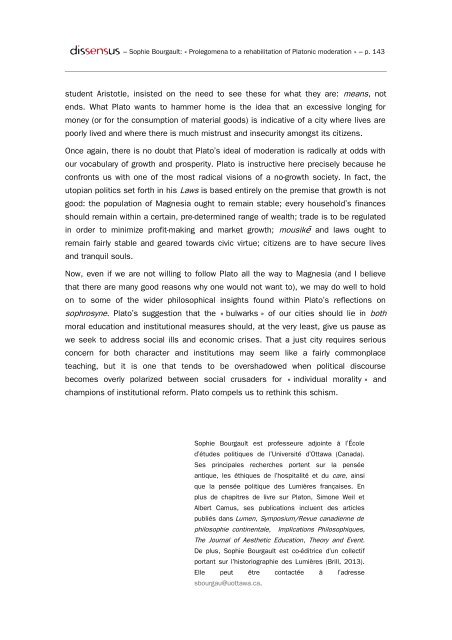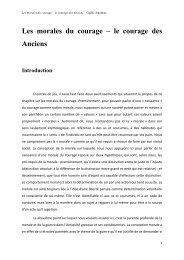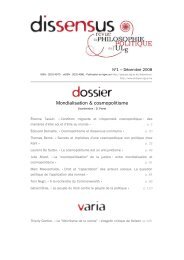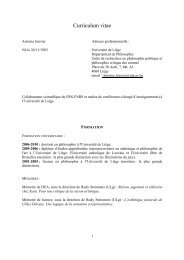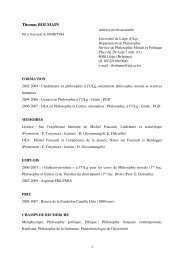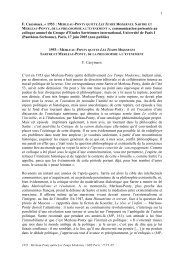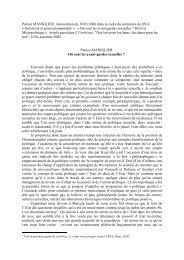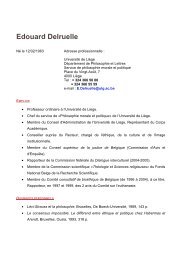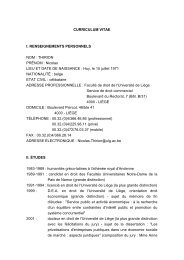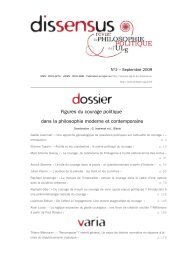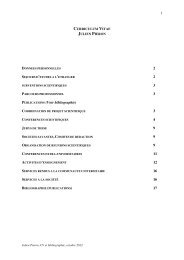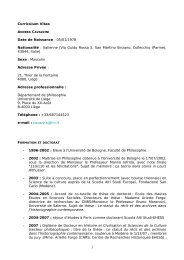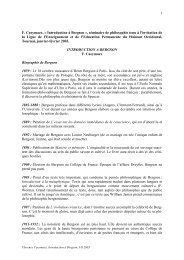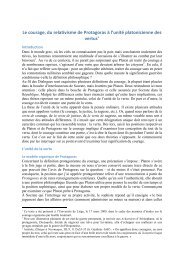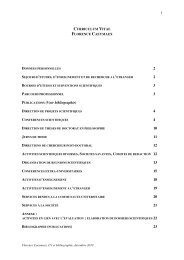Subjectivations politiques et économie des savoirs - Service de ...
Subjectivations politiques et économie des savoirs - Service de ...
Subjectivations politiques et économie des savoirs - Service de ...
Create successful ePaper yourself
Turn your PDF publications into a flip-book with our unique Google optimized e-Paper software.
– Sophie Bourgault: « Prolegomena to a rehabilitation of Platonic mo<strong>de</strong>ration » – p. 143<br />
stu<strong>de</strong>nt Aristotle, insisted on the need to see these for what they are: means, not<br />
ends. What Plato wants to hammer home is the i<strong>de</strong>a that an excessive longing for<br />
money (or for the consumption of material goods) is indicative of a city where lives are<br />
poorly lived and where there is much mistrust and insecurity amongst its citizens.<br />
Once again, there is no doubt that Plato’s i<strong>de</strong>al of mo<strong>de</strong>ration is radically at odds with<br />
our vocabulary of growth and prosperity. Plato is instructive here precisely because he<br />
confronts us with one of the most radical visions of a no-growth soci<strong>et</strong>y. In fact, the<br />
utopian politics s<strong>et</strong> forth in his Laws is based entirely on the premise that growth is not<br />
good: the population of Magnesia ought to remain stable; every household’s finances<br />
should remain within a certain, pre-d<strong>et</strong>ermined range of wealth; tra<strong>de</strong> is to be regulated<br />
in or<strong>de</strong>r to minimize profit-making and mark<strong>et</strong> growth; mousikē and laws ought to<br />
remain fairly stable and geared towards civic virtue; citizens are to have secure lives<br />
and tranquil souls.<br />
Now, even if we are not willing to follow Plato all the way to Magnesia (and I believe<br />
that there are many good reasons why one would not want to), we may do well to hold<br />
on to some of the wi<strong>de</strong>r philosophical insights found within Plato’s reflections on<br />
sophrosyne. Plato’s suggestion that the « bulwarks » of our cities should lie in both<br />
moral education and institutional measures should, at the very least, give us pause as<br />
we seek to address social ills and economic crises. That a just city requires serious<br />
concern for both character and institutions may seem like a fairly commonplace<br />
teaching, but it is one that tends to be overshadowed when political discourse<br />
becomes overly polarized b<strong>et</strong>ween social crusa<strong>de</strong>rs for « individual morality » and<br />
champions of institutional reform. Plato compels us to r<strong>et</strong>hink this schism.<br />
Sophie Bourgault est professeure adjointe à l’École<br />
d’étu<strong><strong>de</strong>s</strong> <strong>politiques</strong> <strong>de</strong> l’Université d’Ottawa (Canada).<br />
Ses principales recherches portent sur la pensée<br />
antique, les éthiques <strong>de</strong> l’hospitalité <strong>et</strong> du care, ainsi<br />
que la pensée politique <strong><strong>de</strong>s</strong> Lumières françaises. En<br />
plus <strong>de</strong> chapitres <strong>de</strong> livre sur Platon, Simone Weil <strong>et</strong><br />
Albert Camus, ses publications incluent <strong><strong>de</strong>s</strong> articles<br />
publiés dans Lumen, Symposium/Revue canadienne <strong>de</strong><br />
philosophie continentale, Implications Philosophiques,<br />
The Journal of Aesth<strong>et</strong>ic Education, Theory and Event.<br />
De plus, Sophie Bourgault est co-éditrice d’un collectif<br />
portant sur l’historiographie <strong><strong>de</strong>s</strong> Lumières (Brill, 2013).<br />
Elle peut être contactée à l’adresse<br />
sbourgau@uottawa.ca.


